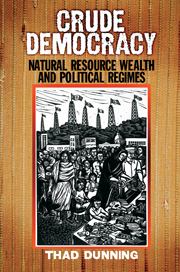Book contents
- Frontmatter
- Contents
- List of Figures
- List of Tables
- Preface and Acknowledgments
- Crude Democracy: Natural Resource Wealth and Political Regimes Cambridge
- 1 DOES OIL PROMOTE DEMOCRACY?
- 2 THE FOUNDATIONS OF RENTIER STATES
- 3 RESOURCE RENTS AND THE POLITICAL REGIME
- 4 STATISTICAL TESTS ON RENTS AND THE REGIME
- 5 THE DEMOCRATIC EFFECT OF RENTS
- 6 RENTIER DEMOCRACY IN COMPARATIVE PERSPECTIVE
- 7 THEORETICAL EXTENSIONS
- 8 CONCLUSION: WHITHER THE RESOURCE CURSE?
- Appendix: Construction of the Simulations
- Bibliography
- Index
7 - THEORETICAL EXTENSIONS
Published online by Cambridge University Press: 17 July 2009
- Frontmatter
- Contents
- List of Figures
- List of Tables
- Preface and Acknowledgments
- Crude Democracy: Natural Resource Wealth and Political Regimes Cambridge
- 1 DOES OIL PROMOTE DEMOCRACY?
- 2 THE FOUNDATIONS OF RENTIER STATES
- 3 RESOURCE RENTS AND THE POLITICAL REGIME
- 4 STATISTICAL TESTS ON RENTS AND THE REGIME
- 5 THE DEMOCRATIC EFFECT OF RENTS
- 6 RENTIER DEMOCRACY IN COMPARATIVE PERSPECTIVE
- 7 THEORETICAL EXTENSIONS
- 8 CONCLUSION: WHITHER THE RESOURCE CURSE?
- Appendix: Construction of the Simulations
- Bibliography
- Index
Summary
Theoretical models, such as those developed in Chapter Three, might fruitfully be compared to Weberian ideal types. They serve as useful devices for theoretical development; comparative statics analysis of models may suggest testable hypotheses that can be evaluated against the evidence. At the same time, of course, models simplify and abstract from “reality”; this is indeed what makes them models. Like Weberian ideal types, models often do not satisfactorily describe any given empirical case, yet they can be useful for organizing analysis of a set of empirical cases.
Nonetheless, points of disconnect between the models and the evidence should obviously be emphasized—not the least because these can provide new insights for theoretical development. As I have emphasized at various points, the case analysis of the previous two chapters, while confirming the importance of the political mechanisms I have emphasized, also suggests fruitful theoretical extensions. In this way (among others), the historical case-study analyses “talk back” to the theoretical models in various important ways. In this penultimate chapter, I develop several theoretical extensions suggested by the evidence presented in previous chapters.
In the first two sections, I begin by commenting briefly and informally on two important issues: the implications of the volatility of government revenues from natural resources for our argument, and the import for my thesis of the so-called Dutch Disease, that is, the often-noted tendency of resource booms to appreciate the real exchange rate and thereby cripple other non-resource tradeable sectors, such as agriculture.
- Type
- Chapter
- Information
- Crude DemocracyNatural Resource Wealth and Political Regimes, pp. 268 - 277Publisher: Cambridge University PressPrint publication year: 2008



